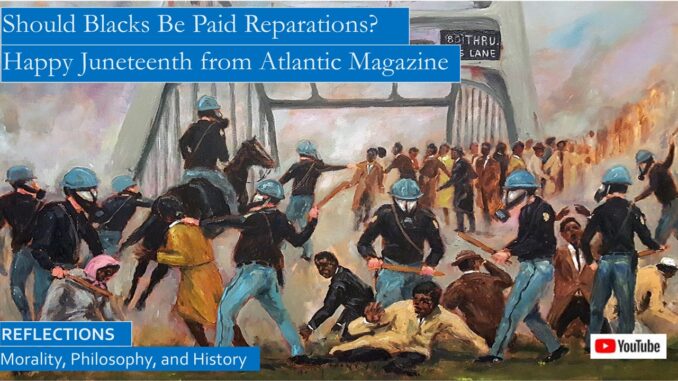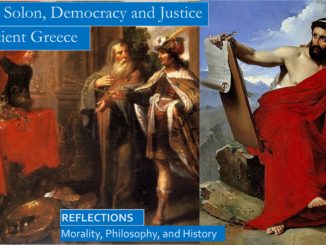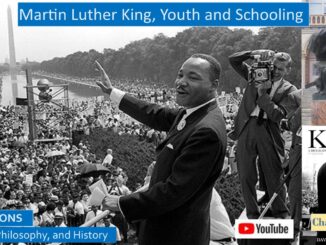
Another June, another Juneteenth holiday. Happy Juneteenth!
The Atlantic Magazine had several articles celebrating this new holiday, mainly an anthology of past articles on Civil Rights, and one article posed an interesting question:
Should the United States pay reparations to its black citizens who are the descendants of slaves many generations ago?
We can ask other questions, such as: Haven’t we helped blacks enough?
Was slavery all that bad? Was Jim Crow and segregation all that bad? Isn’t that in the past?
YouTube video: https://youtu.be/O5RlzSibAtM
Our main source is, of course, the Atlantic magazine, which was started shortly before the Civil War, and has always been a leading proponent of civil rights.
ATLANTIC JUNETEENTH EDITION
One article in the Atlantic Juneteenth collection that I found enlightening was by Bertrand Cooper titled: “The Failure of Affirmative Action.”
The entire article is summarized in the opening paragraph:
“Most of my colleagues are college-educated. I am often the only product of felons, addicts, and foster care whom my peers have encountered outside of time spent volunteering in homeless shelters and group homes. Over the years, whenever affirmative action in higher education has come under threat, these folks have offered their sympathies. They believe that I, a child of a Black father and white mother who grew up in poverty and instability, feel the attacks more acutely. Most Americans seem to think affirmative action sits at the foundation of some beneficent suite of education policies that do something significant for poor Black kids, and that would disappear without the sanction of affirmative action. But the reality is that for the Black poor, a world without affirmative action is just the world as it is: no different than before.”
This is a fairly short article by Atlantic standards, it summarizes his struggles to earn an advanced education. The first hurdle is those whose parents are not affluent professionals do not understand what doors are open to them, and how to apply for these doors to be opened to them. After he had worked and scraped by to earn his education, he learned about the programs he could have applied to, if only he knew they existed. Which means that quite often there are not that many people eager to help you to get ahead. What about the school guidance counselors? Of course, the more affluent the school, the more competent the teachers and counselors.
What about affirmative action? The top-tier, and indeed all schools, often seek a diverse student body, but this does not mean they need to recruit POOR black students, black students of any social class will do. So often the children of affluent black parents benefit the most from affirmative action programs, both because they are less ignorant and more prosperous.[1]
The Atlantic magazine also suggested an anthology of writings to celebrate the new Juneteenth holiday. What is this new holiday? “On June 19, 1865, two years after the signing of the Emancipation Proclamation, word reached Texas notifying enslaved people of their freedom. Juneteenth is a holiday honoring this delayed freedom.” “Despite a host of regional and statewide celebrations over the past century and a half, Juneteenth became recognized as a federal holiday only in 2021, when President Joe Biden signed a bill to that effect, likely as a response to George Floyd’s murder and the ensuing wave of organizing in 2020.”
One of these is itself an anthology, a collection of: “Stories of Slavery, From Those Who Survived It,” by Clint Smith. We invite our readers to explore these stories: “From 1936 to 1938, interviewers from the Depression era Federal Writers’ Project gathered the firsthand accounts of more than 2,300 formerly enslaved people in at least seventeen states. While many of these narratives vividly portray the horror of slavery: of families separated, of backs beaten, of bones crushed, embedded within them are stories of enslaved people dancing together on Saturday evenings as a respite from their work. These are stories of people falling in love, creating pockets of time to see each other when the threat of violence momentarily ceased; of children skipping rocks in a creek or playing hide-and-seek amid towering oak trees, finding moments when the movement of their bodies was not governed by anything other than their own sense of wonder. These small moments, the sort that freedom allows us to take for granted, have stayed with me.”
THE CASE FOR CONSIDERING REPARATIONS
The most compelling story in the collection is “The Case for Reparations” by Ta-Nehisi Coates. He is one of the Black Lives Matter banned authors, banned for making sensitive white children ashamed of their past history, ashamed that slavery was indeed the cause of the Civil War, ashamed of the brutal history of Jim Crow and KKK violence during Reconstruction and Redemption targeted at blacks. Ta-Nehisi Coates’ works were deleted from the AP Black History Studies course in a futile attempt to make it acceptable to Red State schools. If they wanted to change the emphasis to the AP Lost Cause White History Studies course, they would have better luck.
This is Coates’ summary: “Having been enslaved for 250 years, black people were not left to their own devices. They were terrorized. In the Deep South, a second slavery ruled. In the North, legislatures, mayors, civic associations, banks, and citizens all colluded to pin black people into ghettos, where they were overcrowded, overcharged, and undereducated. Businesses discriminated against blacks, awarding them the worst jobs and the worst wages. Police brutalized them in the streets. And the notion that black lives, black bodies, and black wealth were rightful targets remained deeply rooted in the broader society. Now we have half-stepped away from our long centuries of despoilment, promising, ‘Never again.’ But still, we are haunted.”[2]
The first section of Coates’ article is about Clyde Ross. “Clyde Ross was born in 1923, the seventh of thirteen children, near Clarksdale, Mississippi, the home of the blues. Ross’s parents owned and farmed a forty-acre tract of land, flush with cows, hogs, and mules. Ross’s mother would drive to Clarksdale to do her shopping in a horse and buggy, in which she invested all the pride one might place in a Cadillac. The family owned another horse, with a red coat, which they gave to Clyde. The Ross family wanted for little, save that which all black families in the Deep South then desperately desired: the protection of the law.”
Young Clyde’s horse was the first to go, some envious white neighbors coerced the family to sell it to them, they had no choice. Then the county declared he owed three thousand dollars in taxes. Whether he actually did or not is hard to say, quite likely this was concocted. His parents were illiterate, and blacks could not hire attorneys, nor did they have a voice at the courthouse, there was no justice for blacks. The family lost everything, livestock, land, nearly everything, but at least they were not forced to leave the county. But they were forced to become sharecroppers, forced into perpetual peonage, forced into perpetual poverty, forced into perpetual debt.[3]
The story in the 1619 project that I reflected on was even more brutal than this story. In this story, Elmore Bolling in Lowndesboro, Alabama, was murdered for his success. He chose not to own land, because his father had once owned land and it was stolen in much the same manner.
Elmore had a large family, seven children who helped in the family business, “a large house, a general store, a delivery service, a catering company, and a gas station.” “At his peak, Elmore employed as many as forty people, all black like him.” He likely had forty thousand in savings, his total assets in today’s dollars may have been half a million dollars, all money that he earned.
Elmore was prosperous until he started to sell gasoline, provoking the envy of white storeowner. This black man was becoming too uppity! Several white men, including a deputy sheriff, visited Elmore at his store, shot him dead in broad daylight, shot him dead in front of his wife and children. The entire justice system was rigged against them.
White creditors, fabricating non-existent debts, stole all their money, the family feared that they too would be murdered if they objected. They lost their businesses, they forfeited their money, their property was quickly stolen from them.
The 1619 project has an even worse story where many of the family members were thrown in jail for loitering while they were in town shopping. Their farmland and livestock and crops were seized. They were forced to leave town in the middle of the night under threat of death. The father was forced to work on a chain gang for a year, their children were fined.[4]
CLYDE ROSS ENLISTS IN THE ARMY, THEN MOVES TO CHICAGO
Hitler invaded Poland and France, Japan bombed Pearl Harbor, and Clyde Ross was drafted to serve in the Army. He was offered a waiver, but he didn’t want to work as a sharecropper, he preferred to take his chances in the army.
Clyde was amazed. “He was stationed in California. He found that he could go into stores without being bothered. He could walk the streets without being harassed. He could go into a restaurant and receive service.”[5]
During and after the war, six million blacks moved into the northern states in the Great Migration, fleeing lynchings and Jim Crow segregation. In 1910, Before the Great Migration, ninety percent of blacks lived in the rural Southern states, and were a majority in Louisiana, Mississippi, and South Carolina. By 1970, only half of American blacks lived in the Deep South, and eighty percent of blacks lived in cities, mostly in the North.[6]
“Clyde Ross was among” the blacks who moved North. “He came to Chicago in 1947 and took a job as a taster at Campbell’s Soup. He made a stable wage. He married. He had children. His paycheck was his own. No Klansmen stripped him of the vote. When he walked down the street, he did not have to move because a white man was walking past. He did not have to take off his hat or avert his gaze. His journey from peonage to full citizenship seemed near-complete. Only one item was missing: a home, that final badge of entry into the sacred order of the American middle class of the Eisenhower years.”
Except that he could not qualify to buy a house with a mortgage, his black neighborhood was redlined, only whites in white neighborhoods were deemed good credit risks. Clyde was forced to buy his house “on contract,” which meant that the seller kept the contract for the house until it was fully paid. This was not quite as predatory as sharecropping, but it was predatory. If you missed one payment, the seller could invalidate the contract and keep all past payments made. The seller could force the buyer into paying additional insurance or other expenses that came up, and the seller could refuse to make repairs. And the seller often sold the house at an inflated price. Often the seller sold the same house three or four times until someone was actually able to buy it.
The Northern states did have a legal system open to blacks, and the article does not examine this question, but I presume there was some legal redress available. Blacks in Clyde’s neighborhood in Chicago were able to combine into the Contract Buyer’s League, which were able to negotiate reasonable terms for some black buyers. Many whites became millionaires many times over by selling houses to blacks on contract.
Our author Coates also examines the issues behind black poverty. The decades of discrimination, sharecropping, and the contract-buying system means that few black families have inherited wealth. As Coates notes, “Black families, regardless of income, are significantly less wealthy than white families. The Pew Research Center estimates that white households are worth roughly twenty times as much as black households, and that whereas only fifteen percent of whites have zero or negative wealth, more than a third of blacks do. Effectively, the black family in America is working without a safety net. When financial calamity strikes: a medical emergency, divorce, job loss, the fall is precipitous.”
Coates also states: “And just as black families of all incomes remain handicapped by a lack of wealth, so too do they remain handicapped by their restricted choice of neighborhood. Black people with upper-middle-class incomes do not generally live in upper-middle-class neighborhoods. Sharkey’s research shows that black families making $100,000 typically live in the kinds of neighborhoods inhabited by white families making $30,000.” How true this is influenced by the state and city in which you live, more than likely.
After slavery, after the Civil War, blacks continued to face discrimination. As Coates tells us, “Having been enslaved for 250 years, black people were not left to their own devices. They were terrorized. In the Deep South, a second slavery ruled. In the North, legislatures, mayors, civic associations, banks, and citizens all colluded to pin black people into ghettos, where they were overcrowded, overcharged, and undereducated. Businesses discriminated against them, awarding them the worst jobs and the worst wages. Police brutalized them in the streets.”
When Clyde Ross was a child, his older brother Winter had a seizure. He was picked up by the authorities and delivered to Parchman Farm, a 20,000-acre state prison in the Mississippi Delta region.
“He was a gentle person,” Clyde Ross says of his brother. “You know, he was good to everybody. And he started having spells, and he couldn’t control himself. And they had him picked up, because they thought he was dangerous.”
Plunder in the past made plunder in the present efficient. The banks of America understood this. In 2005, Wells Fargo promoted a series of Wealth Building Strategies seminars. Dubbing itself “the nation’s leading originator of home loans to ethnic minority customers,” the bank enrolled black public figures in an ostensible effort to educate blacks on building “generational wealth.” But the “wealth building” seminars were a front for wealth theft, as we learned in the subprime mortgage crisis of 2008.
REVIEW OF OTHER VIDEOS AND BLOGS ON CIVIL RIGHTS
Coates summarizes the history of blacks in America, beginning with describing how brutal slavery was. This brutality was described in the slave autobiography of Frederick Douglass, the runaway slave who became a leading abolitionist orator and best-selling author in the 1830’s, before the Civil War. Douglass and Coates describe how many slave families were broken apart on the slave auction block. We also have the interesting story of the first ex-slave to be ordained a Catholic priest, and the slave autobiography of Booker T Washington, who after the Civil War founded the black trade school and college, the Tuskegee Institute.
Frederick Douglass Tells Us About His Life as a Slave in his Autobiography
http://www.seekingvirtueandwisdom.com/frederick-douglass-tells-us-about-his-life-as-a-slave-in-his-autobiography/
https://youtu.be/7VkzhyNnuQk
Life and Times of Frederick Douglass, After Slavery as an Abolitionist
http://www.seekingvirtueandwisdom.com/life-and-times-of-frederick-douglass-after-slavery-as-an-abolitionist/
https://youtu.be/M0sx85oMRQA
Up From Slavery: Autobiography of Booker T Washington
http://www.seekingvirtueandwisdom.com/up-from-slavery-autobiography-of-booker-t-washington/
https://youtu.be/yxDnJ6sBoJc
Father Augustine Tolton, From Slave to Priest
http://www.seekingvirtueandwisdom.com/father-augustine-tolton-from-slave-to-priest/
https://youtu.be/dZbzWJkAf5k
WEB Du Bois is best known for Black Reconstruction, a history of slavery, the Civil War, and Reconstruction which emphasizes the leading role that African Americans played in these conflicts, arguing that blacks were instrumental in the Union victory in the Civil War. Both Du Bois and Coates remind us that slaves were the most valuable assets before the Civil War, more valuable than land, more valuable than the factories in America. His Souls of Black Folk are revealing essays on the role blacks played in America.
Refuting the Lost Cause: Black Reconstruction by WEB Du Bois
http://www.seekingvirtueandwisdom.com/refuting-the-lost-cause-black-reconstruction-by-web-dubois/
https://youtu.be/JeRCM4PAqPk
History of History of WEB Dubois’ Black Reconstruction, Challenging Lost Cause Myth and Dunning School
https://seekingvirtueandwisdom.com/history-of-history-of-web-dubois-black-reconstruction-challenging-lost-cause-myth-and-dunning-school/
https://youtu.be/CK4V3e-TPFU
WEB Du Bois: The Souls of Black Folk, Personal Essays From Reconstruction Era
http://www.seekingvirtueandwisdom.com/web-dubois-souls-of-black-folk-fighting-for-dignity/
https://youtu.be/x212gx1lNIA
WEB Du Bois, Souls of Black Folk, Essays on Alexander Crummel, Black Episcopal Priest, and Sharecropping
https://seekingvirtueandwisdom.com/web-dubois-souls-of-black-folk-essays-on-alexander-crummel-black-episcopal-priest-and-sharecropping/
https://youtu.be/J3TnQyig6Nk
Frederick Douglass was a first-generation black leader; Booker T Washington was a second-generation black leader; while WEB Du Bois, a contrarian activist leader, was a third-generation black leader. As Du Bois rose in prominence in the black civil rights movement, he came into conflict with the accommodationist educator Booker T Washington. While WEB Dubois encouraged blacks to insist on their civil rights, dignity, and equal opportunity; Booker T Washington encouraged blacks to get an education so they would have marketable skills, to be submissive and hardworking and to save their pennies.
Three Generations of Leading Black Leaders, Frederick Douglass, Booker T Washington, and WEB Du Bois
https://seekingvirtueandwisdom.com/three-generations-of-leading-black-leaders-frederick-douglass-booker-t-washington-and-web-du-bois/
https://youtu.be/DAEg463i-Tc
WEB Du Bois was born free in Massachusetts in the early years of Reconstruction. He was a brilliant student and prolific author, he earned a PhD from Harvard. He was a co-founder of the NAACP and the leading civil rights leader in the years before World War II.
Autobiography of WEB Du Bois: His Youth, School Years, and Early Career
https://seekingvirtueandwisdom.com/autobiography-of-web-dubois-his-youth-and-school-years/
https://youtu.be/N2ZqixUxPmo
Tensions Between WEB Du Bois and Booker T Washington, Accomodation or Activism?
https://seekingvirtueandwisdom.com/tensions-between-web-du-bois-and-booker-t-washington/
https://youtu.be/Ntjl4xqQSfw
WEB Du Bois and the NAACP, Continuing the Fight For Civil Rights
https://seekingvirtueandwisdom.com/web-du-bois-and-the-naacp-continuing-the-fight-for-civil-rights/
https://youtu.be/MNhkq69CIfo
Was WEB Du Bois a Communist? The Later Years of WEB Du Bois
https://seekingvirtueandwisdom.com/was-web-du-bois-a-communist-the-later-years-of-web-du-bois/
https://youtu.be/YwgrKvIjoc0
The brutality of slavery and Reconstruction described by Coates and by WEB Du Bois in Black Reconstruction is also described in the two Yale undergraduate courses on Black History, which are also influenced by Black Reconstruction. The brutality increased when the federal troops were withdrawn from the South during the Redemption era, leading to passing the Jim Crow segregation laws. Coates and these Yale lectures note that blacks were excluded from the New Deal programs and legislation. In particular, social security excluded farmworkers and household servants, thus excluding most black workers.
Nevertheless, the tide started to change during the FDR administration during World War II, he and Truman did support some civil rights initiatives, and real strides were made during the Civil Rights era of the Sixties. Coates discusses the issues of white flight and low-income housing and problems with crime in the ghettoes of Chicago.
American Slavery and the Abolitionists: Yale Lecture Notes
http://www.seekingvirtueandwisdom.com/american-slavery-and-the-abolitionists-yale-lecture-notes/
https://youtu.be/kmLg8CDjOOY
Stories of How Slaves Helped the Union Win the Civil War: Yale Lecture Notes
http://www.seekingvirtueandwisdom.com/stories-of-how-slaves-helped-the-union-win-the-civil-war-yale-lecture-notes/
https://youtu.be/89ulb20cy8Q
Post-Civil War Reconstruction and Redemption History, Yale Lecture Notes
http://www.seekingvirtueandwisdom.com/post-civil-war-reconstruction-and-redemption-history-yale-lecture-notes/
https://youtu.be/f5nPNnvDBCY
American Civil Rights History: Yale Lecture Notes
http://www.seekingvirtueandwisdom.com/american-civil-rights-history-yale-lecture-notes/
Early Civil Rights Era, Through World War II Era: Yale Lecture Notes
https://youtu.be/weGmYOe0Lyg
Civil Rights Era, Sixties and Beyond: Yale Lecture Notes
https://youtu.be/GQesHoV5IdI
We also have videos and blogs on the remarkable career of Ida B Wells, co-founder of the NAACP and journalist who exposed the brutalities of lynching, and also on peonage, or how Southern states used the vagrancy laws to round up both innocent blacks and those guilty of petty crimes, enslaving them in chain gangs and work crews. Sometimes these camps had horrendous mortality rates.
Ida B Wells, Journalist, Brave Woman, and Anti-Lynching Activist
http://www.seekingvirtueandwisdom.com/ida-b-wells-journalist-brave-woman-and-anti-lynching-crusader/
https://youtu.be/sLDHs0AigvY
Slavery By Another Name, Convict Labor in the Jim Crow Deep South
https://seekingvirtueandwisdom.com/slavery-by-another-name-convict-labor-in-the-jim-crow-deep-south/
https://youtu.be/2TCXcEpohaM
Comparing Martin Luther King’s Letter From the Birmingham Jail with Hannah Arendt’s The Banality of Evil
http://www.seekingvirtueandwisdom.com/comparing-martin-luther-kings-letter-from-the-birmingham-jail-with-hannah-arendts-the-banality-of-evil/
https://youtu.be/PqFAUEXbi8k
Few know that the Nazi lawyers, in the early days of Hitler’s regime, used the precedents set by the Deep South Jim Crow segregation race laws of America in drafting the Nuremberg Race Laws that began the persecution of the Jews.
How the Racist Jim Crow Laws Served as Precedent for the Nazi Nuremberg Race Laws
http://www.seekingvirtueandwisdom.com/how-the-racist-jim-crow-laws-served-as-precedent-for-the-nazi-nuremberg-race-laws/
https://youtu.be/_td3jPGD5TI
SHOULD BLACKS BE PAID REPARATIONS FOR PAST INJUSTICES?
Should blacks receive reparations? Ta-Nehisi Coates says that “For the past 25 years, Congressman John Conyers Jr., who represents the Detroit area, has marked every session of Congress by introducing a bill calling for a congressional study of slavery and its lingering effects as well as recommendations for ‘appropriate remedies.’”[7]
What does former President Obama say? “If you ask me theoretically ‘are reparations justified?’ the answer is yes,” he said. “He went on to say that the descendants of those who suffered ‘terrible, cruel, often arbitrary injustices’ deserve compensation and recognition.
Mr Obama’s current stand is in contrast with his earlier comments on the subject. During his presidential campaign in 2008, he appeared to oppose reparations and said, ‘the best reparations we can provide are good schools in the inner city and jobs for people who are unemployed.’ He said that a reparation proposal during his presidency would have met with ‘the politics of white resistance and white resentment’”.[8]
This is the key argument by Coates: “To ignore the fact that one of the oldest republics in the world was erected on a foundation of white supremacy, to pretend that the problems of a dual society are the same as the problems of unregulated capitalism, is to cover the sin of national plunder with the sin of national lying. The lie ignores the fact that reducing American poverty and ending white supremacy are not the same.”[9]
How valid is this statement by Ta-Nehisi Coates? I would agree with this statement logically and rhetorically. But, politically and practically, I would push back and argue that reduction American poverty and ending white supremacy ARE indeed the same. Too many white erroneously believe that they have been harmed by affirmative action for arguments about reparations to get anywhere. Raising the minimum wage to a living wage, possibly to twenty dollars an hour, and ensuring health care, quality public education, and increasing the minimum social security benefits are indeed the proper first step, and white supremacists oppose these policies simply because they will help blacks disproportionately. We do hope, however, that Coates will continue his advocacy for reparations, because if his arguments for reparations ever gain traction, they will likely result in a compromise that will fight poverty for all who are poor, both white and black.
DISCUSSING THE SOURCES
In addition to these sources, the Atlantic magazine had a special Civil War issue. These include essays by such American giants like Mark Twain, Walt Whitman, Henry James, Harriet Beecher Stowe, author of Uncle Tom’s Cabin, Emerson, and Nathaniel Hawthorne, as well as our three generations of black leaders, including Frederick Douglass, Booker T Washington, and WEB Du Bois. If you purchase a subscription to the Atlantic magazine, you have access to all these historical articles from Civil War days forward.[10]
[1] https://www.theatlantic.com/ideas/archive/2023/06/failure-affirmative-action/674439/
[2] https://www.theatlantic.com/newsletters/archive/2023/06/essential-reads-juneteenth/674451/
[3] https://www.theatlantic.com/magazine/archive/2014/06/the-case-for-reparations/361631/
[4] Trymaine Lee, Chapter on Inheritance, The 1619 Project, created by Nikole Hannah-Jones (New York: One World, 2021), pp. 294-305.
[5] https://www.theatlantic.com/magazine/archive/2014/06/the-case-for-reparations/361631/
[6] https://en.wikipedia.org/wiki/Great_Migration_(African_American)
[7] https://www.theatlantic.com/magazine/archive/2014/06/the-case-for-reparations/361631/
[8] https://www.independent.co.uk/news/world/americas/us-politics/obama-reparations-white-resistance-b1807255.html
[9] https://www.theatlantic.com/magazine/archive/2014/06/the-case-for-reparations/361631/
[10] https://accounts.theatlantic.com/accounts/library/digital-exclusives/




Be the first to comment